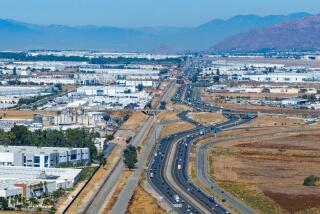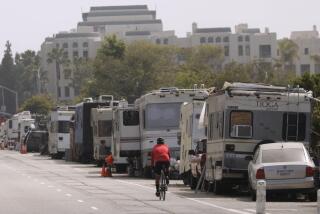Gavin Newsom signs controversial bill regulating California warehouse development

Gov. Gavin Newsom has signed a controversial bill that establishes siting and design standards for industrial warehouses that, according to supporters, would better protect the health of nearby residents.
The legislation comes as developers have converted large swaths of property along Inland Empire freeways into a logistics corridor for e-commerce, connecting goods shipped into Southern California ports with online shoppers across the nation. Although proponents of the developments say they bring jobs and infrastructure improvements, many residents living in the shadow lament the pollution, traffic and neighborhood disruption.
Beginning in 2026, Assembly Bill 98 will prohibit cities and counties from approving new or expanded distribution centers unless they meet specified standards. New warehouse developments will need to be located on major thoroughfares or local roads that mainly serve commercial uses. And warehouses will need to be set back several hundred feet from so-called “sensitive sites” such as homes, schools and healthcare facilities.
Additionally, if a developer demolishes housing to make way for a warehouse, the bill will require two new units of affordable housing for each unit that is destroyed. The developer will have to provide displaced tenants with 12 months’ rent.
Assemblymember Juan Carrillo (D-Palmdale), co-author of the legislation, previously described the measure as a “very delicate compromise” that resulted from lengthy negotiations among a group that included labor, health, environmental and business representatives.
While some labor organizations supported the bill, environmental, community and civic groups statewide objected to the secrecy in which the bill was crafted in the final days of the session and said it fails to hold warehouse developers to higher standards.
Several cities also opposed the legislation, which, according to an analysis by the Senate Appropriations Committee, requires general plan updates that could result in one-time costs for cities and counties ranging from tens of millions to potentially hundreds of millions of dollars.
The League of California Cities is committed to fixing this “costly, burdensome bill” during next year’s legislative session, President Daniel Parra said in a statement Sunday.
“AB 98 is a massive unfunded mandate that will harm our cities, stifle job growth, and threaten the economic lifeblood of communities throughout California,” he said.
Environmental advocates are especially concerned about the bill’s setback requirements for projects involving warehouses 250,000 square feet and larger that are within 900 feet of homes, schools, parks or healthcare facilities.
In those cases, the bill requires that truck loading bays are located at least 300 feet from the property line in areas zoned for industrial use and 500 feet from the property line in areas not zoned for industrial use. Warehouses would also need to comply with design and energy efficiency standards.
Advocates argued the bill would simply enshrine current warehouse development practices into law and undermine local efforts to advocate for the much bigger setbacks recommended by state agencies.
In a 2022 report on best practices for warehouse projects under the state’s environmental laws, the state attorney general’s office recommends locating warehouse facilities so that their property lines are at least 1,000 feet from the property lines of sensitive sites such as homes and schools. It cites the state Air Resources Board, which in 2005 estimated an 80% drop-off in pollutant concentrations at approximately 1,000 feet from a distribution center.
In a statement issued Sunday, environmental groups and community organizations called on the governor and Legislature to work with them next year to get “real protections for our communities.”
“This is disappointing for our communities who will have to bear the brunt of weak standards,” said Andrea Vidaurre, co-founder and policy analyst for the People’s Collective for Environmental Justice in San Bernardino.
This article is part of The Times’ equity reporting initiative, funded by the James Irvine Foundation, exploring the challenges facing low-income workers and the efforts being made to address California’s economic divide.
More to Read
Sign up for Essential California
The most important California stories and recommendations in your inbox every morning.
You may occasionally receive promotional content from the Los Angeles Times.











